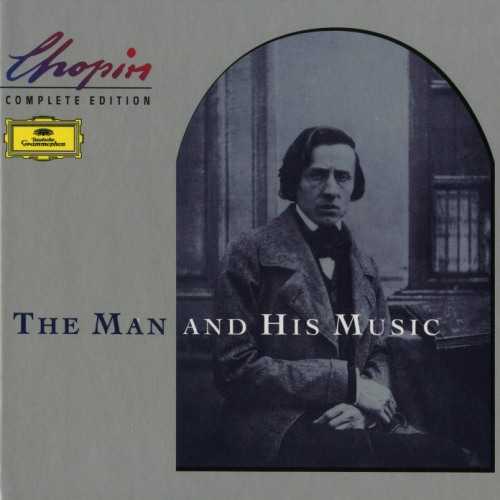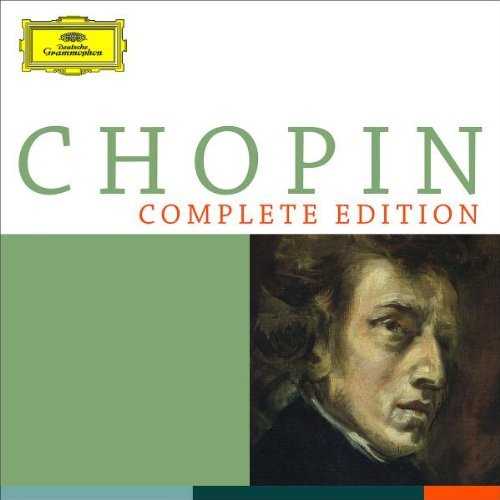
Performer: Frederic Chopin, Carlo Maria Giulini, Eliahu Inbal, Kiril Kondrashin, Willem Van Otterloo, et al.
Orchestra: London Philharmonic Orchestra, Los Angeles Philharmonic Orchestra, Residentie Orkest, Royal Concertgebouw Orchestra
Conductor: Carlo Maria Giulini, Eliahu Inbal, Kiril Kondrashin, Willem Van Otterloo
Composer: Frederic Chopin
Audio CD
SPARS Code: ADD
Number of Discs: 17 CD box set
Format: APE (image+cue)
Label: Deutsche Grammophon
Size: 3.83 GB
Recovery: +3%
Scan: yes
On the 150th anniversary of his death, Deutsche Grammophon released this impressive box set featuring the complete works of Frédéric Chopin. Spread out over 17 CDs, it contains some truly big-name artists–Argerich, Pollini, Barenboim, and Ashkenazy–and a few you’ve probably never heard of. The majority of the set’s nine volumes contain some music newly produced for this undertaking, and a few items (Chopin’s songs, for instance) were recorded specifically for this collection. A well-illustrated book is included–it contains an essay, dateline, and illustrations–and each volume in the set gets its own liner notes. The music? It varies from great to less than great, but most of it is worth hearing. Those accustomed to Rubinstein’s readings of the Mazurkas will find those played by Jean-Marc Luisada less fluid and lacking Rubinstein’s power. Chopin’s songs, seldom heard and filled with elements of Polish folk dances and the less-than-stellar lyrics of the composer’s friend Stefan Witwicki, get a college try here by soprano Elzbieta Szmytka. They sound as good as you’ll hear anywhere (if you can find them). It probably goes without saying that Martha Argerich’s rousing 26 Préludes are some of the set’s more exciting moments. But, really, the entire collection is solid. It should be noted that budget label Naxos has released its own Chopin edition at less than half the price of this set. With Idil Biret as the only performer on that set, you miss out on some of the diverse performances and personalities found here. Also, to please those of us who already own favorite performances of these works, each two-CD volume in the Complete Chopin Edition can be purchased individually. Bravo. –Jason Verlinde
# Piano Concerto No. 1 in E minor, Op. 11, CT. 47
Composed by Fryderyk Chopin
Performed by Concertgebouw Orchestra Amsterdam
with Krystian Zimerman
Conducted by Kiril Kondrashin
# Piano Concerto No. 2 in F minor, Op. 21, CT. 48
Composed by Fryderyk Chopin
Performed by Los Angeles Philharmonic Orchestra
with Krystian Zimerman
Conducted by Carlo Maria Giulini
# Variations on “La ci darem” from Mozart’s Don Giovanni, for piano & orchestra in B flat major, Op. 2, CT. 225
Composed by Fryderyk Chopin
Performed by London Philharmonic Orchestra
with Claudio Arrau
Conducted by Eliahu Inbal
# Fantasy on Polish Airs for piano & orchestra in A major, Op. 13, CT. 41
Composed by Fryderyk Chopin
Performed by London Philharmonic Orchestra
with Claudio Arrau
Conducted by Eliahu Inbal
# Rondo à la krakowiak for piano & orchestra in F major, Op. 14, CT. 194
Composed by Fryderyk Chopin
Performed by The Hague Residentie Orchestra
with Stefan Askenase
Conducted by Willem Van Otterloo
# Andante spianato and Grande Polonaise for piano & orchestra, Op. 22
Composed by Fryderyk Chopin
Performed by Los Angeles Philharmonic Orchestra
with Krystian Zimerman
Conducted by Carlo Maria Giulini
# Ballade for piano No. 1 in G minor, Op. 23, CT. 2
Composed by Fryderyk Chopin
with Krystian Zimerman
# Ballade for piano No. 2 in F major, Op. 38, CT. 3
Composed by Fryderyk Chopin
with Krystian Zimerman
# Ballade for piano No. 3 in A flat major, Op. 47, CT. 4
Composed by Fryderyk Chopin
with Krystian Zimerman
# Ballade for piano No. 4 in F minor, Op. 52, CT. 5
Composed by Fryderyk Chopin
with Krystian Zimerman
# Fantasy for piano in F minor/A flat major, Op. 49, C. 42
Composed by Fryderyk Chopin
with Krystian Zimerman
# Trois nouvelles études, for piano, KK IIb/3, CT. 38-40 (B. 130)
Composed by Fryderyk Chopin
with Anatol Ugorski
# Funeral march for piano in C minor, Op. 72/2, CT. 50
Composed by Fryderyk Chopin
with Anatol Ugorski
# Ecossaises (3) for piano, Op. 72/3, CT. 11-13
Composed by Fryderyk Chopin
with Anatol Ugorski
# Etudes (12) for piano, Op. 10, CT. 14-25
Composed by Fryderyk Chopin
with Maurizio Pollini
# Etudes (12) for piano, Op. 25, CT. 26-37
Composed by Fryderyk Chopin
with Maurizio Pollini
# Barcarolle for piano in F sharp major, Op. 60, CT. 6
Composed by Fryderyk Chopin
with Maurizio Pollini
# Berceuse for piano in D flat major, Op. 57, CT. 7
Composed by Fryderyk Chopin
with Gunter Hermann
# Mazurkas (4) for piano, Op. 6, CT. 51-54
Composed by Fryderyk Chopin
with Jean-Marc Luisada
# Mazurkas (5) for piano, Op. 7, CT. 56-59
Composed by Fryderyk Chopin
with Jean-Marc Luisada
# Mazurkas (4) for piano, Op. 17, CT. 60-63
Composed by Fryderyk Chopin
with Jean-Marc Luisada
# Mazurkas (4) for piano, Op. 24, CT. 64-67
Composed by Fryderyk Chopin
with Jean-Marc Luisada
# Mazurkas (4) for piano, Op. 30, CT. 68-71
Composed by Fryderyk Chopin
with Jean-Marc Luisada
# Mazurkas (4) for piano, Op. 33, CT. 72-75
Composed by Fryderyk Chopin
with Jean-Marc Luisada
# Mazurkas (4) for piano, Op. 41, CT. 76-79
Composed by Fryderyk Chopin
with Jean-Marc Luisada
# Mazurkas (3) for piano, Op. 50, CT. 80-82
Composed by Fryderyk Chopin
with Jean-Marc Luisada
# Mazurkas (3) for piano, Op. 56, CT. 83-85
Composed by Fryderyk Chopin
with Jean-Marc Luisada
# Mazurkas (3) for piano, Op. 59, CT. 86-88
Composed by Fryderyk Chopin
with Jean-Marc Luisada
# Mazurkas (3) for piano, Op. 63, CT. 89-91
Composed by Fryderyk Chopin
with Jean-Marc Luisada
# Mazurkas (4) for piano, Op. 67, CT. 92-95
Composed by Fryderyk Chopin
with Jean-Marc Luisada
# Mazurkas (4) for piano, Op. 68, CT. 96-99
Composed by Fryderyk Chopin
with Jean-Marc Luisada
# Mazurka for piano in A minor (“à Émile Gaillard”), KK IIb/5, CT. 106 (B. 140)
Composed by Fryderyk Chopin
with Lilya Zilberstein
# Mazurka for piano in A minor (“Notre temps”), KK IIb/4, CT. 105 (B. 134)
Composed by Fryderyk Chopin
with Lilya Zilberstein
# Mazurka for piano in B flat major, KK IIa/3
Composed by Fryderyk Chopin
with Lilya Zilberstein
# Mazurka for piano in B flat major, KK IIa/2, CT. 101 (B. 16/2)
Composed by Fryderyk Chopin
with Lilya Zilberstein
# Mazurka for piano in A flat major, KK IVb/4, CT. 104 (B. 85)
Composed by Fryderyk Chopin
with Lilya Zilberstein
# Work(s) Mazurka in C major, KK 1225-1226
Composed by Fryderyk Chopin
with Lilya Zilberstein
# Mazurka for piano in B flat major, KK IVb/1, CT. 103 (B. 73)
Composed by Fryderyk Chopin
with Lilya Zilberstein
# Mazurka for piano in D major, KK IVb/2
Composed by Fryderyk Chopin
with Lilya Zilberstein
# Nocturnes (3) for piano, Op. 9, CT. 108-110
Composed by Fryderyk Chopin
with Daniel Barenboim
# Nocturnes (3) for piano, Op. 15, CT. 111-113
Composed by Fryderyk Chopin
with Daniel Barenboim
# Nocturnes (2) for piano, Op. 27, CT. 114-115
Composed by Fryderyk Chopin
with Daniel Barenboim
# Nocturnes (2) for piano, Op. 32, CT. 116-117
Composed by Fryderyk Chopin
with Daniel Barenboim
# Nocturnes (2) for piano, Op. 37, CT. 118-119
Composed by Fryderyk Chopin
with Daniel Barenboim
# Nocturnes (2) for piano, Op. 48, CT. 120-121
Composed by Fryderyk Chopin
with Daniel Barenboim
# Nocturnes (2) for piano, Op. 55, CT. 122-123
Composed by Fryderyk Chopin
with Daniel Barenboim
# Nocturnes (2) for piano, Op. 62, CT. 124-125
Composed by Fryderyk Chopin
with Daniel Barenboim
# Nocturne for piano in E minor, KK IV/b
Composed by Fryderyk Chopin
with Daniel Barenboim
# Nocturne for piano in C sharp minor (doubtful), KK Anh.Ia/6
Composed by Fryderyk Chopin
with Daniel Barenboim
# Nocturne for piano in C minor, KK IVb/8, CT. 128 (B. 108)
Composed by Fryderyk Chopin
with Daniel Barenboim
# Polonaises (2) for piano, Op. 26, CT. 150-151
Composed by Fryderyk Chopin
with Maurizio Pollini
# Polonaises (2) for piano, Op. 40, CT. 152-153
Composed by Fryderyk Chopin
with Maurizio Pollini
# Polonaise for piano No. 5 in F sharp minor, Op. 44, CT. 154
Composed by Fryderyk Chopin
with Maurizio Pollini
# Polonaise for piano No. 6 in A flat major (“Héroique”), Op. 53, CT. 155
Composed by Fryderyk Chopin
with Maurizio Pollini
# Polonaise-fantasy for piano No. 7 in A flat major, Op. 61, CT. 156
Composed by Fryderyk Chopin
with Maurizio Pollini
# Andante spianato and Grande Polonaise for piano & orchestra, Op. 22
Composed by Fryderyk Chopin
with Martha Argerich
# Polonaises (3) for piano, Op. 71, CT. 157-159
Composed by Fryderyk Chopin
with Anatol Ugorski
# Polonaise for piano in B flat minor, KK IVa/5, CT. 164 (B. 13)
Composed by Fryderyk Chopin
with Anatol Ugorski
# Polonaise for piano in G flat major, KK IV/a8, CT. 165 (B. 36)
Composed by Fryderyk Chopin
with Anatol Ugorski
# Polonaise for piano in G minor, KK IIa/1, CT. 161 (B. 1)
Composed by Fryderyk Chopin
with Anatol Ugorski
# Polonaise for piano in B flat major, KK IVa/1, CT. 160 (B. 3)
Composed by Fryderyk Chopin
with Anatol Ugorski
# Polonaise for piano in A flat major, KK IVa/2, CT. 162 (B. 5)
Composed by Fryderyk Chopin
with Anatol Ugorski
# Polonaise for piano in G sharp minor, KK IVa/3, CT. 163 (B. 6)
Composed by Fryderyk Chopin
with Anatol Ugorski
# Bourrées (2) for piano (arrangement), KK. VIIb/1, 2
Composed by Fryderyk Chopin
with Anatol Ugorski
# Galopp for piano in A flat major, KK IVc/13
Composed by Fryderyk Chopin
with Anatol Ugorski
# Moderato for piano in E major, KK IVb/12, CT. 107 (B. 151)
Composed by Fryderyk Chopin
with Anatol Ugorski
# Cantabile for piano in B flat major, KK. IVb/6, CT. 9 (B. 84)
Composed by Fryderyk Chopin
with Anatol Ugorski
# Fugue for piano in A minor, KK IVc/2 (B. 144)
Composed by Fryderyk Chopin
with Anatol Ugorski
# Largo for piano in E flat major, KK IVb/5, CT. 49 (B. 109)
Composed by Fryderyk Chopin
with Anatol Ugorski
# Preludes (24) for piano, Op. 28, CT. 166-189
Composed by Fryderyk Chopin
with Martha Argerich, Kurt Bauer
# Prelude for piano No. 25 in C sharp minor, Op. 45, CT. 190
Composed by Fryderyk Chopin
with Martha Argerich
# Work(s) Prelude in A flat major, Op. Posth., KK 1231 – 1232
Composed by Fryderyk Chopin
with Martha Argerich
# Impromptu for piano in A flat major, Op. 29, CT. 43
Composed by Fryderyk Chopin
with Stanislav Bunin
# Impromptu for piano in F sharp major, Op. 36, CT. 44
Composed by Fryderyk Chopin
with Stanislav Bunin
# Impromptu for piano in G flat major, Op. 51, CT. 45
Composed by Fryderyk Chopin
with Stanislav Bunin
# Fantasy-Impromptu for piano in C sharp minor, Op. 66, CT. 46
Composed by Fryderyk Chopin
with Stanislav Bunin
# Scherzo for piano No. 1 in B minor, Op. 20, CT. 197
Composed by Fryderyk Chopin
with Maurizio Pollini
# Scherzo for piano No. 2 in B flat minor, Op. 31, CT. 198
Composed by Fryderyk Chopin
with Maurizio Pollini
# Scherzo for piano No. 3 in C sharp minor, Op. 39, CT. 199
Composed by Fryderyk Chopin
with Maurizio Pollini
# Scherzo for piano No. 4 in E major, Op. 54, CT. 200
Composed by Fryderyk Chopin
with Maurizio Pollini
# Rondo for piano in C minor, Op. 1, CT. 192
Composed by Fryderyk Chopin
with Lilya Zilberstein
# Rondo à la Mazur for piano in F major, Op. 5. CT. 193
Composed by Fryderyk Chopin
with Lilya Zilberstein
# Introduction in C minor and Rondo in E flat major for piano, Op. 16, CT. 195
Composed by Fryderyk Chopin
with Mikhail Pletnev
# Rondo for 2 pianos (or solo piano) in C major, Op. 73, CT. 196
Composed by Fryderyk Chopin
with Kurt Bauer, Heidi Bung
# Piano Sonata No. 1 in C minor, Op. 4, CT. 201
Composed by Fryderyk Chopin
with Lilya Zilberstein
# Piano Sonata No. 2 in B flat minor, Op. 35, CT. 202
Composed by Fryderyk Chopin
with Maurizio Pollini
# Piano Sonata No. 3 in B minor, Op. 58, CT. 203
Composed by Fryderyk Chopin
with Maurizio Pollini
# Introduction and variations on a German Air (“Der Schweizerbub”) for piano in E major, KK. IVa/4, CT. 227 (B. 14)
Composed by Fryderyk Chopin
with Tamas Vasary
# Variations for piano in A major (“Souvenir de Paganini”), KK IVa/10, CT. 229 (B. 37) (spurious)
Composed by Fryderyk Chopin
with Lilya Zilberstein
# Variations brillantes on “Je vends des scapulaires” from Hérold’s Ludovic, for piano in B flat major, Op. 12, CT. 226
Composed by Fryderyk Chopin
with Lilya Zilberstein
# Variations on a theme of Moore, for piano, 4 hands, in D major, KK IVa/6, CT 228 (B. 12a)
Composed by Fryderyk Chopin
with Vovka Ashkenazy, Vladimir Ashkenazy
# Variation on the March from Bellini’s I Puritani, for piano in E major (No. 6 of collaborative work “Hexaméron”), KK IIb/2, CT. 230
Composed by Fryderyk Chopin
with Vladimir Ashkenazy
# Allegro de concert for piano in A major, Op. 46, CT. 1
Composed by Fryderyk Chopin
with Vladimir Ashkenazy
# Bolero for piano in C major/A major, Op. 19, CT. 8
Composed by Fryderyk Chopin
with Anatol Ugorski
# Tarantelle for piano in A flat major, Op. 43, CT. 205
Composed by Fryderyk Chopin
with Anatol Ugorski
# Waltz for piano No. 1 in E flat major, Op. 18, CT. 207
Composed by Fryderyk Chopin
with Jean-Marc Luisada
# Waltzes (3) for piano, Op. 34, CT. 208-210
Composed by Fryderyk Chopin
with Jean-Marc Luisada
# Waltz for piano No. 5 in A flat major, Op. 42, CT. 211
Composed by Fryderyk Chopin
with Jean-Marc Luisada
# Waltzes (3) for piano, Op. 64, CT. 212-214
Composed by Fryderyk Chopin
with Jean-Marc Luisada
# Waltzes (2) for piano, Op. 69, CT. 215-216
Composed by Fryderyk Chopin
with Jean-Marc Luisada
# Waltzes (3) for piano, Op. 70, CT. 217-219
Composed by Fryderyk Chopin
with Jean-Marc Luisada
# Waltz for piano in E minor, KK IVa/15, CT. 222 (B. 56)
Composed by Fryderyk Chopin
with Jean-Marc Luisada
# Waltz for piano in A flat major, KK IVa/13, CT. 221 (B. 21)
Composed by Fryderyk Chopin
with Jean-Marc Luisada
# Waltz for piano in E major, KK IVa/12, CT. 220 (B. 44)
Composed by Fryderyk Chopin
with Jean-Marc Luisada
# Waltz for piano in E flat major (spurious), KK IVa/14 (B. 46)
Composed by Fryderyk Chopin
with Jean-Marc Luisada
# Waltz for piano in E flat major, KK IVb/10, CT. 223
Composed by Fryderyk Chopin
with Lilya Zilberstein
# Waltz for piano in A minor, KK IVb/11, CT. 224 (B. 150)
Composed by Fryderyk Chopin
with Lilya Zilberstein
# Piano Trio in G minor, Op. 8, CT. 206
Composed by Fryderyk Chopin
with Beaux Arts Trio
# Introduction and Polonaise brillante for cello & piano in C major, Op. 3, CT. 148
Composed by Fryderyk Chopin
with Martha Argerich, Mstislav Rostropovich
# Grand Duo on themes from Meyerbeer’s Robert le diable for cello & piano in E major, KK IIb/1, CT. 10 (B. 70)
Composed by Fryderyk Chopin
with Anner Bylsma, Lambert Orkis
# Sonata for cello & piano in G minor, Op. 65, CT. 204
Composed by Fryderyk Chopin
with Martha Argerich, Mstislav Rostropovich
# Songs (17) for voice & piano, Op. 74, CT. 129-145
Composed by Fryderyk Chopin
with Elzbieta Szmytka, Malcolm Martineau
# Czary (Charms), song for voice & piano, KK. IVa/11, CT 146 (B. 51)
Composed by Fryderyk Chopin
with Elzbieta Szmytka, Malcolm Martineau
# Dumka (Reverie), song for voice & piano, KK. IVb/9, CT 147 (B. 132)
Composed by Fryderyk Chopin
with Elzbieta Szmytka, Malcolm Martineau
chopin_complete_edition02.rar – 266.0 MB
chopin_complete_edition03.rar – 223.5 MB
chopin_complete_edition04.rar – 260.0 MB
chopin_complete_edition05.rar – 244.3 MB
chopin_complete_edition06.rar – 239.4 MB
chopin_complete_edition07.rar – 146.1 MB
chopin_complete_edition08.rar – 134.4 MB
chopin_complete_edition09.rar – 242.0 MB
chopin_complete_edition10.rar – 227.6 MB
chopin_complete_edition11.rar – 218.7 MB
chopin_complete_edition12.rar – 256.2 MB
chopin_complete_edition13.rar – 258.8 MB
chopin_complete_edition14.rar – 165.2 MB
chopin_complete_edition15.rar – 202.0 MB
chopin_complete_edition16.rar – 329.6 MB
chopin_complete_edition17.rar – 172.1 MB
At least 16 / 19 well spent hours
In my opinion there is no more effective way to ruin a great musical performance than to record it in front of an audience who cannot control their coughs. The first disc starts out with a 1979 live recording of Chopin’s first piano/orchestra concerto featuring pianist Krystian Zimerman and the Royal Concertgebouw Orchestra of Amsterdam. The performance is good, but doesn’t allow the listener full concentration,–and therefore not full enjoyment–as a distracting and annoying audience can be heard coughing, sneezing, and clearing their throats even above the orchestra’s playing in mezzo forte – it gets worse, of course, at dynamically quieter musical parts. Other distractions, like chairs creaking, cracking and squeaking, pages being turned probably inches away from a microphone (perhaps to give the page-turner a chance to say “Did you hear that? That was me,”) and people stomping/dropping things (?) add to the incapability of the listener’s full enjoyment. I’ve heard much worse, however, but considering that the recording technique is no older than 25 years, this is on the verge of being unacceptable. Sure – there can be a certain charm in hearing such “humanity” on a recording, especially when it’s older, but I don’t think many would disagree that this is a bit too much. Hearing the opening of piano/orchestra concerto no.2, and knowing that the 18+ hours of music to come aren’t going to be interrupted by coughs, is a big relief. My favorite Chopin interpreter is–and might always be–Rubinstein; his playing is straight forward, he cuts to the chase quickly, yet somehow manages to leave room for sensitivity and emotion. His performances, of course–since he never recorded a note for Deutsche Grammophon,–are not included in this “complete edition,” so aside from suggestions that certain waltzes are missing, that is something that makes this boxed set incomplete for me. Pollini’s general interpretation of Chopin is in my opinion, as in many others’, quite weak in comparison to Argerich’s, Zimerman’s, or the passionate playing of Daniel Barenboim. Here Pollini performs Etudes, Scherzos, Sonatas and Polonaises. At times, during the Etudes of op. 10, I feel like I’m getting more Maurizio than I am getting Fryderyk, even though the performance (especially on no.3) may invite feelings of thriving despite the performer’s occasional roaring in the left channel. The Scherzos feature some troublesome factors; first and foremost the sound (of this 1990 recording) isn’t at all as good as one would expect. It’s far worse than several older recordings of this set – at only six seconds into the first Scherzo (op.20) one can’t avoid acknowledging obvious distortion – the recording has clearly been done with too much input level. Clips noises continue throughout the grainy and dull sound picture of these pieces. Second of all, the noises Pollini makes while playing can be quite off putting. At times he sounds like a boy with a voice just breaking experiencing climax of coition, and as we all know, Chopin had a prudish aversion to overt sexuality. One reason why Pollini’s performance of the Scherzos being called “troublesome” might be harsh, is that musically he handles them ok, and I’d think that’s what’s essential, but Deutsche Grammophon has made the odd decision of including Pollini’s recording of Sonata no. 2, op.35 (a.k.a. “Funeral March”) from 1984 in this set, instead of Argerich’s recording from 1975. First of all, Argerich’s version has clearer sound (at least on the newly refurbished “The Originals” edition…but then again, that was released in 2002,) but second of all, and more importantly, her playing is far more straight forward during the first part of the Sonata (Grave,) whereas Pollini shows too much mercy both for strong dynamics and tempo throughout. Furthermore he’s on the verge of playing parts of the March suggesting “lento,” as if it read “rubato” (it’s a MARCH!) His performance of Piano Sonata no.3 is also a bit lifeless, but the hour long disc of Polonaises recorded 1975 he handles surprisingly well (the occasional phlegmatic karaoke-roars may need a little time getting used to, though.) Several of these interpreters make some less musical noises while playing – Zimerman, for instance, breathes heavily through the nose after each and every completed phrase throughout all off his performances (although it can’t be heard with orchestra.) When listening to his solo performances in head phones, the constant snuffling can distract and annoy quite a bit, but I know that I do the exact same thing when I play, myself, so perhaps I shouldn’t complain until I’ve managed to rid the inconvenient problem myself. Besides Pollini’s Polonaise interpretations, there’s another (76 minute long) disc of Polonaises featuring mainly Ugorski, but also Argerich. Something that seems odd to me is that the sound quality of Argerich’s 1974 recording once again is superior to a newer recording – in this case to the 1999 recording of Ugorski, which doesn’t feature much middle in the sound picture, but uneven soughing and clip noises! Both their performances (but especially Argerich’s,) are about as enjoyable as Chopin interpretations can be, I’d think, as is the technically and musically perfect, touching and mesmerizing Nocturne interpretations of Daniel Barenboim, recorded in 1981 – his playing here equals close to two hours of pure magic. While being a Rubinstein fan, I’m going to have to say that Barenboim’s way of playing the Nocturnes is just how I think they should be played; they call for this somewhat gentle touch mixed in with their brutal sincerity, but I suggest for those who (especially) enjoy the Etudes, Sonatas and Scherzos to listen to Rubinstein’s recordings of the works (available on RCA’s Rubinstein Collection, vol. 26, vol. 45 and vol. 46.) Pollini is, of course, a fine performer, but I’d suggest listening to his interpretations of Prokofiev’s and Stravinsky’s work instead.
Rubinstein recorded the preludes (op.28) in their entirety only once, in 1946, which means that they aren’t available in RCA’s collection with preferable sound quality, but on this set Martha Argerich delivers a great performance of the 26 preludes (no.1-24, op.28, plus 25, op.45, and 26, op. 35,) recorded in 1975. One prelude that in my opinion should always be played as slow and gentle as possible is no.15 (a.k.a. “The Raindrop Prelude.”) What I’d like to describe as a prefect version of the piece is performed by–despite my having done a lot of research–a, to me unknown performer, but runs at 6:08 minutes. Argerich rushes the whole piece a bit (the drops fall too closely -) the fact that her version runs at 4:51 should say a lot. Of the approximately 20 different performances I’ve heard of this particular prelude (obviously one of my favorites,) Argerich’s is the shortest, and lays somewhere in the swamp among other “medium integral” versions. She delivers exciting performances of the other preludes, though – the first time I heard them, I hit repeat on my CD player, and listened to nothing else for three days.
The Mazurkas, here performed by Jean-Marc Luisada and Lilya Zilberstein, are performed–while beautifully–quite carefully and loosely. For those who’d like a more restrained performance of the pieces, RCA’s Rubinstein Collection, vol. 50, is recommended.
Besides all the music for only piano(s,) Chopin also composed 80 minutes worth of chamber music, which here is performed by Beaux Arts Trio, et al. He also wrote 45+ minutes worth of songs, which here is performed by soprano Elzbieta Szmytka and pianist Malcolm Martineau on a 1999 performance. I don’t feel qualified to comment on solo singing in Polish, but while I don’t care for the occasional close-to-full effect vibrato, I like Martineau’s piano playing and the almost folksy melodies and arrangements. This music distinguishes itself by far from the rest of the music in the set. Translations to several languages of the lyrics to the 19 songs are included.
The stereophony on all recordings is great, the overall sound quality on all discs (when considering the years of the recordings) I’d give a 4/5, but still rate the whole package 9/10 – I’d think that some (both older and newer) recordings could have been transferred better, while some sound superior to what you’d dare dream of. This is definitely the best complete edition of Chopin’s music available, and perhaps the best collection of works available on disc by any classical composer. A lot of work has been put into the set’s design, the sound, and certainly the amount and accuracy of interesting info given in the enclosed illustrated 140 page hard-cover book (of which a fifth is written in English) and in the 40-60 page booklets (also illustrated) included in each volume; practically everything you’ll ever need to know about the composer (and these recordings) is included here along with all the music he wrote. Well worthy of your time and money.




THANK YOU, THANK YOU, THANK YOU!
Amazing collection you have in this blog, and in loseless quality!
Thanks a lot for sharing and fir making all this wonderful music available to anyone who can’t spend lots of money in discs.
Bolshoie spasibo!